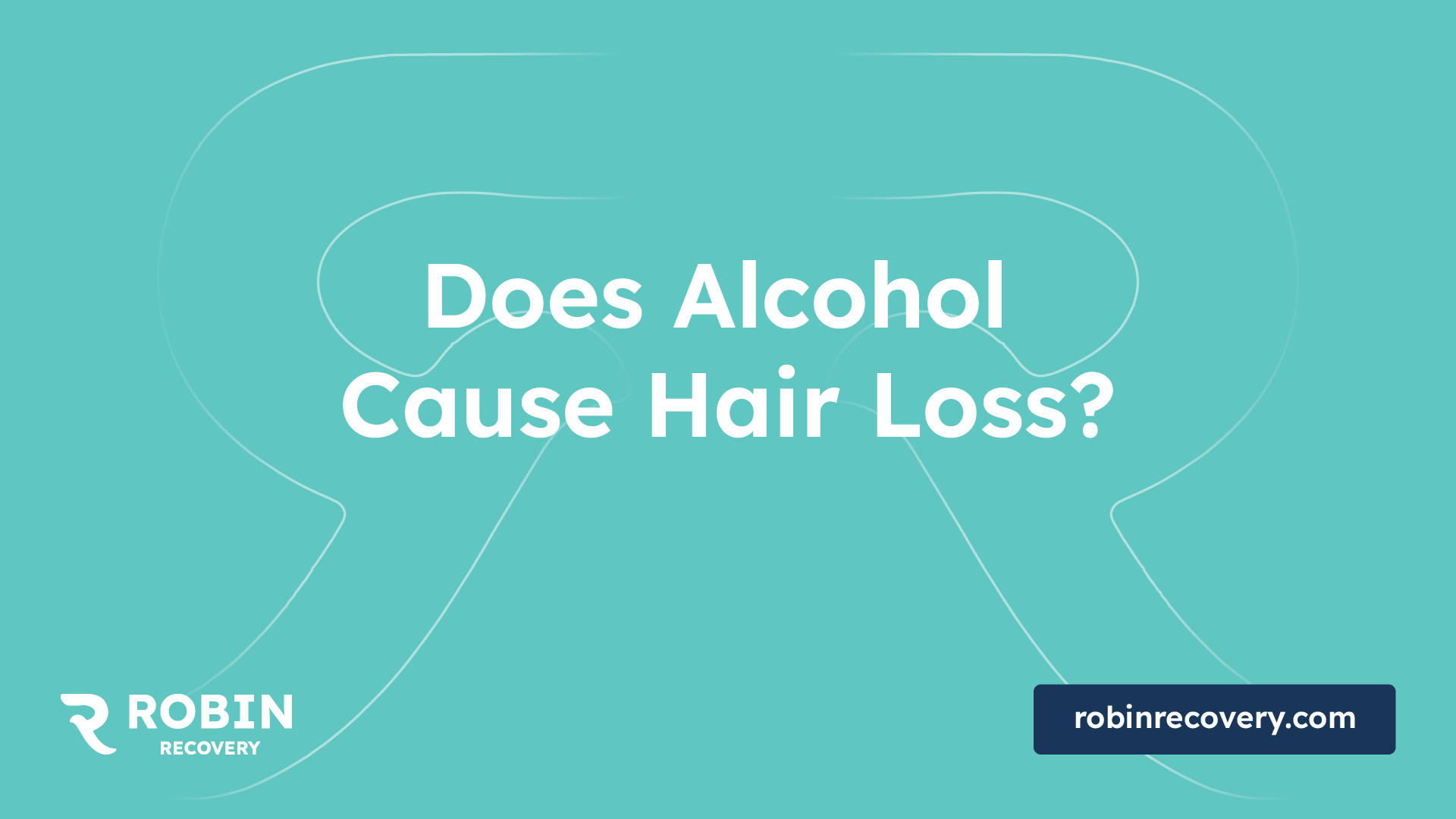Does Alcohol Cause Hair Loss?

Alcohol and Hair Health
Understanding the connection between alcohol consumption and hair health is essential for anyone concerned about hair loss. There are two significant factors to consider: nutritional deficiencies caused by alcohol and its hormonal effects on the body.

Impact of Alcohol on Nutritional Deficiencies
Drinking excessive amounts of alcohol can lead to deficiencies or malabsorption of vital nutrients such as zinc, copper, and protein. These nutritional shortfalls may contribute to hair shedding and overall hair health deterioration [1].
NutrientEffect of DeficiencyZincMay lead to various types of hair lossCopperEssential for overall hair health; deficiency may contribute to hair issuesProteinSevere deficiency can cause skin, hair, and nail problems, resulting in hair loss
Alcohol has a direct impact on the body's ability to absorb these nutrients, particularly zinc and copper. Research indicates that insufficient levels of zinc can exacerbate hair loss conditions, making it crucial to address potential deficiencies for maintaining hair wellness.
Hormonal Effects of Alcohol on Hair
Chronic heavy drinking can disrupt hormone levels responsible for regulating essential bodily processes, including hair growth and shedding. Alcohol affects the hormonal balance that is vital for maintaining healthy hair, leading to potential hair loss.
The hormonal irregularities caused by alcohol may interfere with the hair growth cycle, resulting in decreased hair density or premature shedding. For women and men alike, maintaining a healthy hormonal balance is critical for preventing hair loss.
To learn more about the potential impacts of substance use on hair, read our article on could drug use lead to hair loss?. By addressing alcohol habits and understanding their effects on hair health, individuals can take proactive steps toward maintaining their hair wellness.
Nutrient Deficiencies and Hair Loss
Alcohol consumption can significantly impact hair health through nutritional deficiencies. Key nutrients like zinc, copper, and protein are essential for maintaining hair structure and promoting growth. Excessive drinking may interfere with the absorption of these nutrients, leading to various forms of hair loss.
Zinc and Copper Deficiency
Zinc is crucial for hair tissue growth and repair. Evidence suggests that a deficiency in zinc may be associated with hair loss conditions, such as alopecia areata and male and female pattern baldness. When alcohol is consumed, it can hinder the body's ability to absorb zinc effectively. This decreased absorption can lead to low serum zinc levels, contributing to hair shedding.
Similarly, copper plays an important role in hair health. Low levels of copper have been linked to various hair conditions, including premature graying. Studies indicate that patients with premature graying had significantly lower copper levels compared to a control group. Both zinc and copper are vital for the formation of hair keratin and the overall health of hair follicles.
NutrientRole in Hair HealthImpact of DeficiencyZincTissue growth and repairHair shedding, alopecia areataCopperPigmentation and collagen synthesisPremature graying
Protein Deficiency and Hair Wellness
Protein is a fundamental component of hair structure. Hair is primarily made up of keratin, a type of protein. A lack of sufficient protein can lead to thinning hair and decreased hair health. Nutritional deficiencies, particularly protein-energy malnutrition, can also result in reversible hypopigmentation of hair. Individuals who suffer chronic protein loss may experience similar outcomes.
To support hair health, it is essential to ensure adequate protein intake, particularly for those who consume alcohol regularly. This means incorporating protein-rich foods into the diet to help maintain hair strength and growth.
Nutritional ElementImportanceOutcomes of DeficiencyProteinKeratin formation for hairThinning hair, reduced growth
By addressing these nutrient deficiencies, individuals may prevent some of the hair loss associated with alcohol consumption. For those wondering, does drinking alcohol cause hair loss?, the answer lies in its potential to disrupt essential nutrients, making it vital to manage alcohol intake and focus on a balanced diet to promote hair wellness.
Hormonal Influences on Hair Growth
Understanding the relationship between alcohol consumption and hair loss requires an examination of how alcohol affects hormones and thyroid function. Chronic heavy drinking can disrupt the hormonal balance crucial for hair health.
Effects on Thyroid Function
Alcohol consumption can negatively impact thyroid function. The thyroid gland plays a significant role in regulating metabolism and hair growth. Drinking too much alcohol on a regular basis can interfere with the thyroid's hormone production, which is essential for overall health and well-being. A poorly functioning thyroid can lead to various health issues, including hair loss.
Effect of Alcohol on Thyroid FunctionDescriptionHormone DisruptionAlters hormones related to growth and metabolism.Metabolic SlowdownCan lead to reduced hair growth rates.Increased SheddingImbalance may accelerate hair shedding cycles.
Hormonal Regulation and Hair Health
Hormones responsible for regulating processes like hair growth and shedding can be affected by chronic heavy alcohol use. Alcohol can disrupt the delicate balance of hormones, leading to potential hair thinning and loss. Studies show that chronic usage leads to adverse effects on hormone interactions responsible for hair health.
When hormones fluctuate due to alcohol misuse, individuals may experience:
Hormonal Effects of AlcoholResulting Hair ConditionElevated Stress HormonesCan lead to telogen effluvium, a temporary hair loss condition.Decreased Estrogen LevelsMay worsen hair quality and promote hair thinning.Imbalanced AndrogensCan contribute to conditions like androgenic alopecia.
Maintaining hormonal balance is critical for healthy hair growth. Individuals concerned with hair loss due to alcohol consumption should consult health professionals to discuss the implications of their drinking habits on their overall health, including hair wellness. Additional resources on recovery strategies can be found in articles like can your heart heal after addiction? and the importance of sleep during recovery.
Lifestyle Factors and Hair Loss
Smoking and Hair Thinning
Smoking is a significant lifestyle factor that can contribute to hair thinning and loss. Research indicates that smoking increases the risk of developing alopecia areata, a condition characterized by sudden hair loss in patches. Current smokers exhibit a higher risk, with a hazard ratio of 1.88, indicating nearly double the likelihood of experiencing this condition compared to non-smokers [4].
Additionally, smoking has been linked to early-onset achromotrichia, which is the premature graying of hair. The prooxidant effects of smoking can lead to increased oxidative stress, resulting in damage to hair follicle melanocytes, which are responsible for hair pigmentation.
EffectDescriptionAlopecia Areata RiskCurrent smokers have a higher risk for alopecia areata with a hazard ratio of 1.88.Premature GrayingSmoking correlates significantly with early hair graying due to oxidative stress.
Alcohol Related Appearance Effects
Alcohol consumption may also have detrimental effects on hair health. Chronic alcohol use can impact the body's ability to absorb essential nutrients, leading to deficiencies in zinc, copper, and protein—all vital for maintaining healthy hair. Zinc deficiency, in particular, has been associated with various types of hair loss, including alopecia areata and telogen effluvium, emphasizing that individuals should consider their alcohol intake when assessing their hair health [1].
Alcohol can interfere with protein absorption as well, which is critical for hair growth and strength. These combined effects can result in hair shedding and a decrease in hair thickness over time.
NutrientImpact of AlcoholZincDeficiency contributes to hair loss; alcohol affects absorption.CopperMalabsorption can lead to weakened hair health.ProteinInterference in absorption leads to hair shedding.
It's crucial to be aware of the lifestyle factors, including smoking and alcohol consumption, when considering the question of does drinking alcohol cause hair loss? Addressing these habits can play a significant role in promoting better hair health. For more information on the relationship between substances and hair loss, check out our articles on could drug use lead to hair loss? and how does alcoholism develop over time?.
Diseases and Hair Impacts
Alcohol's Role in Chronic Diseases
Excessive alcohol consumption is known to weaken the immune system, making the body more prone to infections and various illnesses. This diversion of the body's resources can indirectly affect hair health, as the body's defenses become compromised. Chronic drinkers show a higher susceptibility to diseases such as pneumonia and tuberculosis in comparison to non-drinkers [5].
Moreover, the relationship between alcohol use and thyroid function is particularly noteworthy. Long-term alcohol use can lead to severe disorders of the thyroid, affecting hormone interactions that are crucial for hair growth regulation. Chronic hypo- and hyperthyroidism, associated with prolonged alcohol consumption, contributes to hair thinning and loss.
DiseaseEffect of AlcoholImmune System WeaknessIncreased susceptibility to infectionsThyroid DisordersPotential for hair loss due to hormonal imbalanceRespiratory InfectionsHigher risk of pneumonia and tuberculosis
Hair Health Complications
The connection between hair loss and alcohol exposure encompasses several health issues, including skin problems, digestive disruptions, and liver complications. Chronic alcohol use can lead to skin inflammation, potentially exacerbating conditions like atopic dermatitis and psoriasis, which negatively affect hair health.
Other factors contributing to hair complications include digestive issues, as alcohol can disrupt nutrient absorption, leading to deficiencies crucial for hair vitality. Additionally, impaired liver function affects the body's ability to cleanse toxins, compounding epithelial issues that influence hair growth.
In conclusion, the effects of alcohol on chronic diseases and associated hair health complications warrant attention. Addressing these issues involves understanding the comprehensive impact of alcohol consumption on overall health, including its specific effects on hair. For further insights on managing addiction and promoting mental health, refer to our article on ways to take care of your mental health.
Preventing Hair Loss
Moderation in Alcohol Consumption
Moderate alcohol consumption is crucial for maintaining overall health, which extends to hair wellness. Drinking excessively can weaken the immune system, making the body more vulnerable to infections and illnesses. This diversion of the body’s resources can negatively impact healthy hair growth.
Research suggests that consuming more than two standard drinks per day increases the risk of developing chronic diseases, which can have indirect effects on hair health. According to Australia's national health guidelines, individuals are advised to adhere to low-risk drinking levels to minimize health risks.
The World Health Organization highlights the significant number of global deaths associated with alcohol consumption. Thus, moderating intake can help mitigate health issues that might also affect hair health.
Alcohol Consumption LevelRecommended Action0-2 standard drinks per dayLow-risk drinking, beneficial for healthMore than 2 standard drinks per dayIncreased risk of health issues, including hair lossComplete abstinenceOptimal for individuals with alcohol-related health concerns
Addressing Underlying Causes
Tackling underlying causes of hair loss is essential in promoting hair regrowth. Addressing issues related to alcohol use and its physiological effects is beneficial. Keeping alcohol consumption at moderate levels can significantly contribute to overall wellness and healthier hair growth.
In addition to alcohol moderation, lifestyle factors such as avoiding smoking and maintaining a balanced diet play a vital role in addressing the root causes of hair loss. These actions can help enhance the condition and growth of hair, leading to a more vibrant appearance.
Recognizing and managing these underlying conditions, such as nutritional deficiencies and hormonal imbalances, can further support healthy hair growth and prevent hair loss over time.
For additional insights, check other resources on ways to take care of your mental health and explore ways to beat boredom in addiction recovery.
References
[2]:
[3]:
[4]:
[5]:
[6]:
